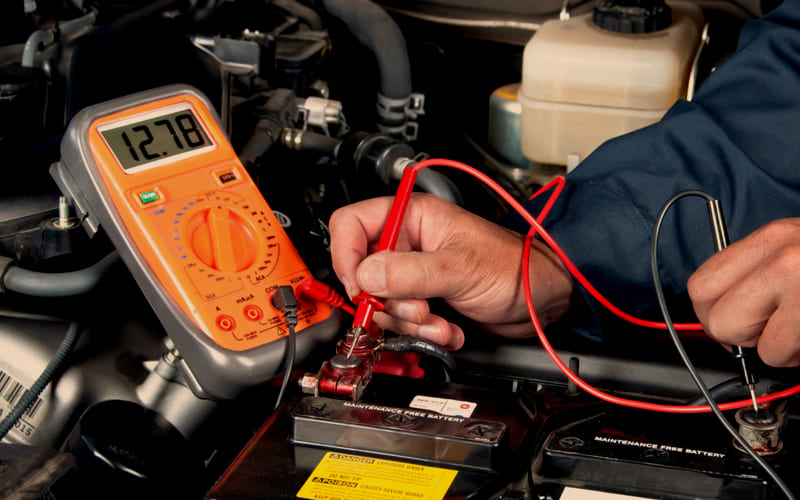Get a Call today Call Us
Are you looking for Battery Services for your vehicle?

Welcome to Mill Tyres - your vehicle and tyre specialist in Boston.
On this page, we would like to provide you with some important information about vehicle batteries.
The battery (starter battery) supplies both the starter and other consumers (central locking, brake light, parking light etc.) with electric current. This is again fed to it by mechanical energy from the engine. Both cold and old age can make sure that the battery is not working properly.
With us, you will learn how a car battery is installed, which show signs of a defect and what you have to consider during a repair.
Construction and function of the car battery
In the actual sense, the battery is an accumulator because it is rechargeable.
It is connected to the alternator - nowadays called generator - and is powered by it. Inside of the car battery, lead cells are connected in series.
Only in this way can the high voltages required for the starting process of the internal combustion engine be generated.
A further component of the starter battery is the so-called battery acid. This serves the lead cells as an electrolyte, i.e. as a supplier of the ions. Here, as a rule, 37% sulfuric acid is used.
What types of batteries are available?
Not every battery can be used in any car. The voltage values and the shape of the housing must match the respective autotype. The capacity (given in amp hours ah) indicates how much current can be taken at a certain voltage.
In principle, one differentiates between three different battery types. The calcium battery is used very often by car manufacturers. A great advantage is the low liquid loss due to the calcium alloys. They discharge much shorter and can withstand much higher temperatures.
The AGM batteries (Absorbent Glass Mat) also have a very low self-discharge due to the built-in glass fibre nonwoven and can be used in almost all positions. The disadvantage is the low heat resistance.
A further form is the lead accumulators (also wet batteries). The electrons in the battery are lead (or a lead alloy) and are rechargeable. Due to their long life, they are often used as a starter battery.
The average lifetime of a starter battery, with a regular vehicle use, is about 7 years. This duration is also dependent on the manufacturer, the quality and the maintenance of the battery.
Care and Maintenance
The modern models of the batteries are normally maintenance-free. They do not have to be refilled with distilled water at regular intervals. However, make sure that there is no deep discharge. This means that the battery is completely discharged.
This can happen for example when you accidentally leave the light on over night. The empty battery can then only be charged with a separate charger. You should also contact a specialist here. The functionality of the battery should also be inspected at appropriate intervals (at least once a year).
The dangers
Great care must be taken when handling car batteries since the individual components are toxic, combustible or even explosive. Defective batteries can 'gas'. This means that the sulfuric acid in its interior forms oxyhydrogen. If this does not escape, there should be no sources of ignition in the vicinity.
Also, such a battery should not be bridged in this case since sparking may occur. Should battery acid leak from the battery, it must be washed as quickly as possible with water. Should skin contact occur, a doctor must be consulted.
Since functioning batteries are charged, there is also a danger. The poles should not be touched. Also, ensure that the body of the vehicle is not being touched while working on the battery.
These signs indicate a possible defect
The following is a selection of the most common symptoms:
- Bad engine start
- Your car often starts weakly or not always on the first attempt.
- Electric consumers have cutouts during cold start
- Various electrical consumers (for example the radio) in the vehicle have a cold start fault
Replace the battery
Our experts at Mill Tyres Boston strongly recommend getting vehicle batteries changed by a specialist.
If the vehicle battery has to be replaced, all consumers in the vehicle must be deactivated in advance. Otherwise, it can lead to electrical shock which can cause personal injury. If a radio with a security code is installed, it is recommended to write the code down beforehand.
The next step involves disconnecting the cables from the starter battery. First, the negative and then the positive pole must be removed. If this is the case, the brackets of the battery can be loosened or removed by loosening the screws.
The new car battery is installed in the reverse order.
Do not throw the old battery away - especially not in normal household waste.
When getting the battery changed at our specialist workshop, we will certainly take care of the correct disposal of your old battery free of charge.
The cost of this repair at a glance
The work required for removing and installing the battery is relatively low.
The price for a new battery varies greatly, depending on size, quality, additional accessories you might need and how much power it needs to deliver.
Large vehicles (transporters, caravans) require a larger car battery, while small cars are equipped with a less powerful battery. Quality differences also play a role here - particularly cheap batteries can fail quickly at cold temperatures.
What you should consider when using the battery in your car:
The battery (starter battery) supplies the starter with electric current
Not every battery can be installed in any vehicle - voltage, shape and housing must fit
The car battery usually has a warranty period of 24 months
Pay attention to possible defects (bad start-up)
Have any checks, repairs or changes carried out in a specialist workshop.
Stay safe with Mill Tyre's battery service in Boston.
